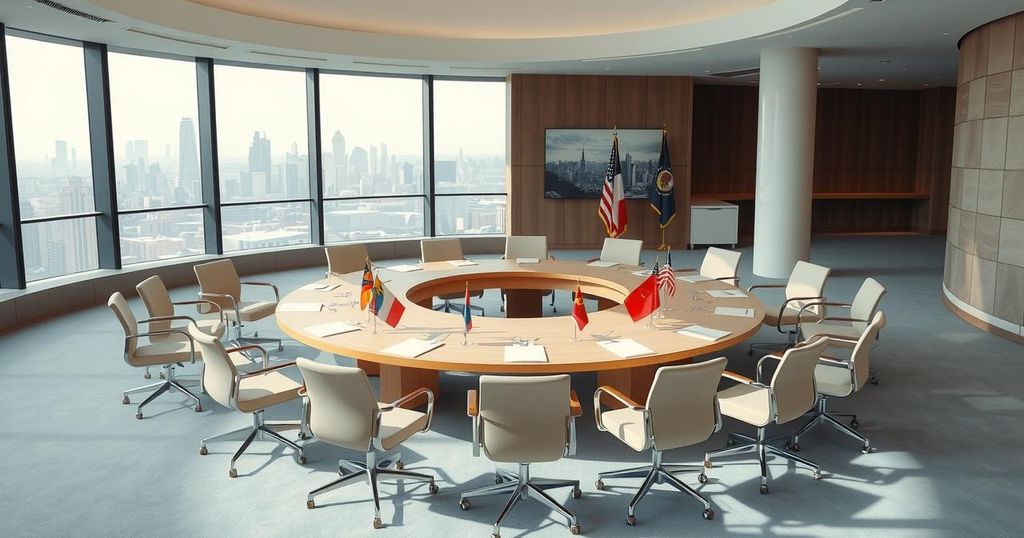The UAE is lobbying the Trump administration to reject an Arab League-endorsed Gaza reconstruction plan from Egypt. This has created tensions among US diplomats, who fear it may harm US interests in the region. The UAE’s actions reveal deeper rivalries regarding governance and influence over Hamas in Gaza, with implications for US-Egypt relations and military assistance. The complex interplay of alliances continues to evolve amid the ongoing conflict and changing political landscape.
The UAE is actively lobbying the Trump administration to undermine a Gaza reconstruction plan proposed by Egypt and endorsed by the Arab League. This has raised concerns among US diplomats about potential harm to US interests in the Middle East, highlighting a growing rivalry over governance and reconstruction roles in Gaza, especially regarding Hamas’s influence.
Despite both backing Mohammed Dahlan, a former Fatah leader, the UAE’s actions contradict their earlier support of the Arab League’s plan. A US official indicated that “The UAE could not be the lone state opposing the Arab League plan when it was agreed, but they are trashing it with the Trump administration.” The UAE has criticized the plan as unmanageable, aiming to sway US opinion against it.
UAE Ambassador Yousef al-Otaiba is pushing for the US to exert pressure on Egypt to accept the forcible displacement of Palestinians, supporting Trump’s earlier position. Historically, the UAE has sought to minimize Hamas’s power, which is closely linked to the Muslim Brotherhood, a faction both the UAE and Egypt oppose.
Egypt’s plan for Gaza, which includes governance by the Palestinian Authority and potential international peacekeeper involvement, has received skepticism from the UAE. While Hamas reportedly accepted this plan, concerns remain over Israel’s willingness to allow such international presence in the conflict.
Tensions escalated as the Trump administration’s support for an Israeli return to conflict emerged. The recent collapse of a ceasefire and subsequent violence in Gaza have reignited these discussions. The US proposed options concerning the fate of Hamas captives, but Hamas insists on a permanent ceasefire, contrary to US proposals for temporary truces.
Adding to the complexity, a US envoy’s negotiations with Hamas sparked backlash from Israel and affected diplomatic relations. While some US officials believe the Emirati objections might jeopardize US-Egypt relations, the US also hinted at a future reduction in military aid, which Egypt relies upon heavily for its stability and cooperation.
The military aid package to Egypt, amounting to $1.3 billion annually, is often scrutinized, especially as it impacts US leverage over Egyptian policy, particularly regarding Gaza. The current administration’s shifting focus on international alliances may further complicate these dynamics.
Intriguingly, both the UAE and Egypt see Dahlan as a potential leader for Gaza’s future governance. Although their cooperation continues, differing approaches in regional conflicts, particularly in Sudan, signal complex relations. Given Dahlan’s historic position and UAE connections, his ascent could redefine the political landscape of Gaza post-conflict.
Moreover, US sentiments towards Egypt’s Gaza plan clash with the views of career diplomats, further complicating administrative strategies. After initially advocating for Palestinian displacement, the Trump administration softened its stance following diplomatic pressure but remains in a precarious position between regional players and strategic interests.
In summary, the UAE’s lobbying against the Arab League’s Gaza plan emphasizes court battles for post-war governance, particularly regarding Hamas’s influence. This has introduced complications for US-Egypt relations, especially concerning military aid. Current dynamics reflect broader geopolitical tensions in the region, raising questions about the future of Gaza’s governance under leaders like Mohammed Dahlan. Both US and regional strategies continue to evolve amidst ongoing violence and diplomatic pressures.
Original Source: www.middleeasteye.net






